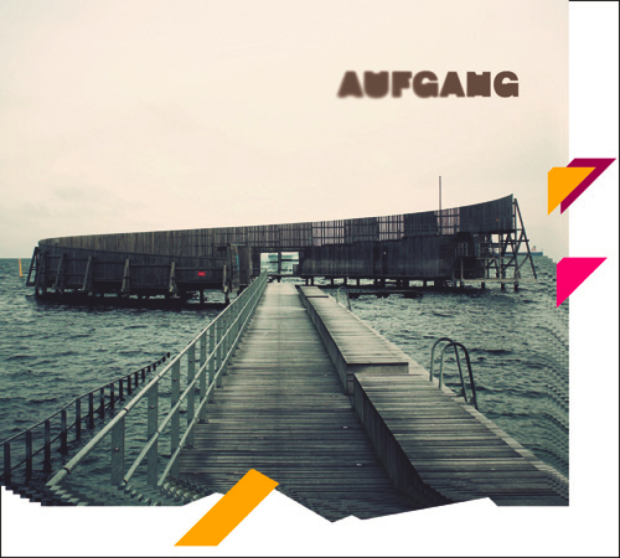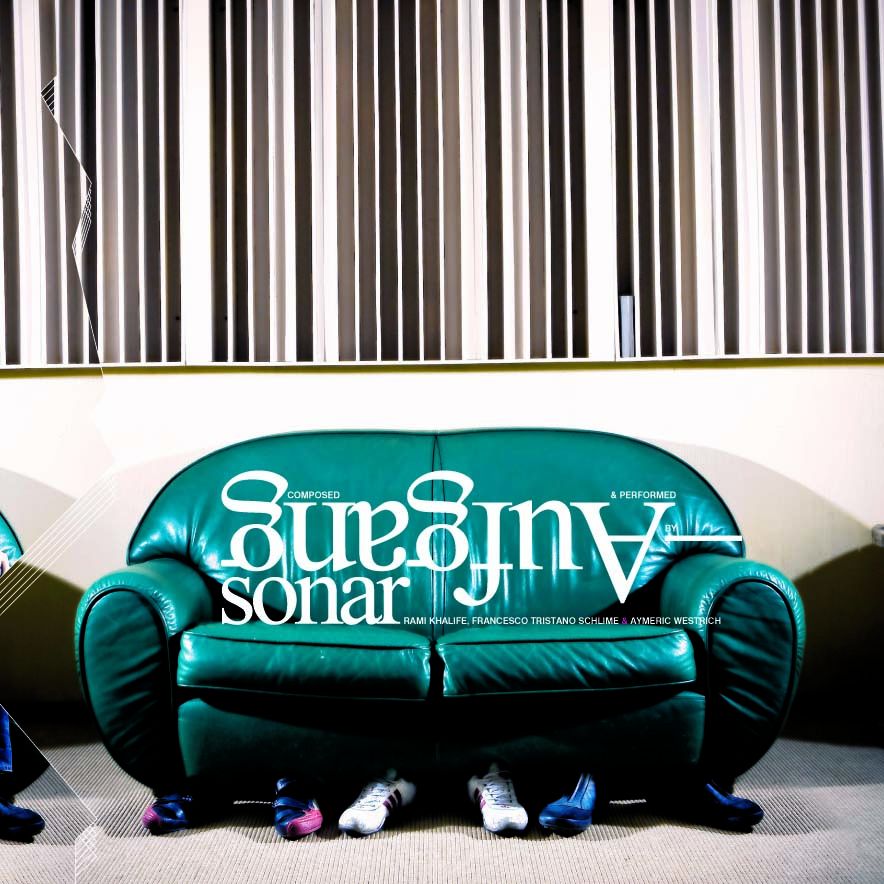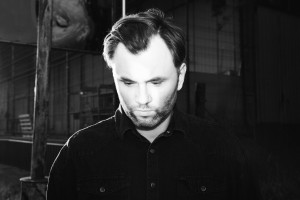MySpace : myspace.com/aufgangsonar
Website : infine-music.com
Release date : 12/10/09
Format : CD / Digital
![]() C’est en l’an 2000 que Rami Khalifé et Francesco Tristano se rencontrent à New York, où tous deux étudient le piano à la très prestigieuse Juilliard School. Fréquentant les clubs (au moins) aussi assidûment que les cours, les deux compères se lancent en marge dans leur cursus classique dans un apprentissage passionné de la musique électronique, en particulier la house, dont New York est l’un des plus brûlant foyer. Bientôt ils commencent à jouer ensemble et pratiquent d’emblée un mélange des genres en rupture radicale avec les sectarismes de tous poils.
C’est en l’an 2000 que Rami Khalifé et Francesco Tristano se rencontrent à New York, où tous deux étudient le piano à la très prestigieuse Juilliard School. Fréquentant les clubs (au moins) aussi assidûment que les cours, les deux compères se lancent en marge dans leur cursus classique dans un apprentissage passionné de la musique électronique, en particulier la house, dont New York est l’un des plus brûlant foyer. Bientôt ils commencent à jouer ensemble et pratiquent d’emblée un mélange des genres en rupture radicale avec les sectarismes de tous poils.
Les choses se précisent un peu plus en 2001 lorsqu’Aymeric Westrich, musicien (batteur de formation) issu du même conservatoire que Rami, se rend à New York et, guidé par ses deux amis, s’immerge dans la musique électronique. Les trois scellent alors leur union au non d’une attirance commune pour l’expérimentation sans limites.
Le groupe va demeurer en suspens pendant un certain temps, durant lequel chacun poursuit son chemin de son côté. Fils d’un célèbre compositeur libanais, Rami donne de nombreux concerts à travers le monde, aux côtés de son père ou avec d’autres formations, publie deux albums de musique classique et travaille pour le cinéma et la danse. Opérant dans la sphère hip-hop en tant que compositeur et producteur, Aymeric exerce également ses talents de batteur au sein de Cassius, en pleine euphorie french touch.
Considéré comme l’un des pianistes les plus doués de sa génération, Francesco publie plusieurs enregistrements très remarqués (notamment les Variations Goldberg de Bach, en 2001) et remporte une belle brassée de prix. Sa carrière prend une nouvelle direction en 2007 avec la parution de Nor For Piano : post-produit par Fernando Corona (alias Murcof), le disque transcende les barrières stylistiques et contient trois frappantes reprises de standards de la musique électronique (dont l’hymne The Bells par Jeff Mills). Poursuivant toujours plus loin ses investigations, Fransesco s’associe ensuite avec Moritz Von Oswald, légendaire sorcier du son berlinois, pour signer Auricle Bio/On, captivant disque hors-norme, sorti sur InFiné en novembre 2008 et constitué de deux plages d’une vingtaine de minutes chacune.
L’acte de naissance officiel d’Aufgang intervient en juin 2005, à l’occasion d’un concept barcelonais dans le cadre du fameux festival Sónar. Les circonstances ayant amené à ce concert méritent d’être dévoilées : lors d’une soirée dans une galerie barcelonaise, Jeff Mills et l’un des programateurs du Sónar assistent à un récital de Francesco. A la fin de celui-ci est rejoint par Rami et tous deux se lancent dans une interprétation débridée de The Bells. Jeff Mills s’entousiasme. Quant au programmateur du Sónar, il sait ce qui lui reste à faire… Arrive le jour J : chauffé à blanc après cinq nuits de répétitions intensives, le trio livre une performance explosive et suscite l’enthousiasme d’un public averti. A partir de ce moment-là, l’aventure va continuer de plus belle.
Dopés par l’énergie de ce concert inaugural, Francesco, Rami et Aymeric s’attachent à structurer leurs morceaux et à forger un language original, à la croisée de l’acoustique et de l’électronique. Nourrie d’influences diverses et irriguée par le flot impétueux de l’improvisation, leur musique est de celles qui refusent obstinément de se laisser catégoriser : elle cherche avant tout à vibrer et faire vibrer, et envoie gaiement valser les étiquettes.
« Ce n’est ni de la techno acoustique ni de la musique classique assaisonnée à la sauce électronique, façon Wendy Carlos« , précise Fransesco qui, gardant bien Fluxus à l’esprit, rappelle que « le piano est aussi une machine : c’est une grosse boite avec un mécanisme à l’intérieur ». En utilisant ses pianos comme des machines et en les confrontant à d’autres machines, à commencer par la batterie, Aufgang parvient à générer une musique aussi étonnante que puissante.
Foncièrement organique, cette musique se révèle pleinement sur scène, où elle peut faire des ravages, comme ce fut le cas, par exemple, aux Transmusicales 2007 et lors du festival Venlo (Hollande) en 2008, les milliers de spectateurs présents réagissaient au quart de tour.
De la communion collective à l’écoute individuelle, du dancefloor au salon, la musique d’Aufgang se caractérise également par son caractère évolutif : sans cesse retravaillé, chaque morceau peut passer par de nombreux états. Une fois enregistré et gravé, il ne s’arrête pas de vivre, bien au contraire.
Cette aptitude à l’improvisation et à la réinvention transparaît clairement sur le premier d’album d’Aufgang qui est sorti hier sur InFiné/Discograph. Le disque, dont le mixage a été assuré par François Baurin (véritable quatrième membre du groupe), succède à l’épatant maxi Sonar, qui comprend deux redoutables remixs signés Spitzer et Krazy Baldhead, paru en début d’année. Fruit d’un long processus de maturation, près de quatre ans, l’album reflète parfaitement la créativité d’un trio en complète osmose.
Empreint de nuances multiples, de la musique contemporaine à l’électro, en passnt par le post-rock, l’album témoigne d’une audace et d’une liberté de jeu exaltantes, assez comparables à celle des Battles, autre groupe kamikaze surgi ces dernières années.
Jusqu’où ces jeunes gens peuvent-t-ils aller ? Une chose est sûre : dès Channel 7, échevelé morceau d’ouverture qui éveille le bondissant souvenir du mythique Jaguar de Rolando, on sent que cet Ascenseur (Aufgang en allemand) vas nous emmener très haut…
![]() The epic tale of Aufgang starts with the new century in the star city of the New World. Rami Khalifé and Francesco Tristano met in the year 2000 in New York where they were both studying the piano at the very prestigious Juilliard School. Being almost as assiduous in their clubbing than in their studies, the two began a passionate affair with electronic music on the side of their classical training, focussing on House Music, New York being one of its hotspot. They soon began playing together, creating from the start an explosive mix of genres transcending any possible musical bigotry.
The epic tale of Aufgang starts with the new century in the star city of the New World. Rami Khalifé and Francesco Tristano met in the year 2000 in New York where they were both studying the piano at the very prestigious Juilliard School. Being almost as assiduous in their clubbing than in their studies, the two began a passionate affair with electronic music on the side of their classical training, focussing on House Music, New York being one of its hotspot. They soon began playing together, creating from the start an explosive mix of genres transcending any possible musical bigotry.
Things started shaping-up in 2001 when Aymeric Westrich, a musician (former drummer) from the same school as Rami, went to New York and, guided by his two friends, immersed himself in electronic music. Thus the three boys sealed their union under the auspices of a common attraction for limitless experimentation.
The band was put on the back burner for a time while they each pursued their individual projects. The son of a famous Lebanese composer, Rami played numerous concerts across the world, alongside his father and with other bands, published two classical albums and worked for films and dance. Aymeric, operating on the Hip Hop scene as a producer and a composer, also expressed his talent as a drummer with Cassius in the full swing of the French Touch euphoria.
Considered one of the most talented pianists of his generation, Francesco published several well-noticed recordings (including Bach’s Goldberg Variations in 2001) and was rewarded with a multitude of prizes. His career took a new turn in 2007 with the release of Nor For Piano: post-produced by Fernando Corona (aka Murcof), this record transcended the musical genres and contained three striking covers of electronic music classic tracks (including The Bells by Jeff Mills). Pursuing his investigations, Francesco teamed-up with Moritz von Oswald – the legendary Berlin sound sorcerer – to create Auricle Bio/On, a captivating singular album, released by InFiné in November 2008, consisting of two 20 minute tracks.
Aufgang’s official date of birth is June 2005 when they played at Barcelona’s famous Sónar Festival. The circumstances leading to their playing this concert are worth mentioning: Francesco was playing a recital at an event in an art gallery in Barcelona when Jeff Mills turned-up with the booker for the Sonar Festival. At the end of the show, Rami joined Francesco for an unbridled interpretation of The Bells. Jeff Mills loved it and the Sonar Festival booker got to work… On the day of the show and after rehearsing non-stop for five nights the trio delivered an explosive performance and won over the crowd of connoisseurs. The adventure continued from then on.
Fired-up by this initial show, Francesco, Rami and Aymeric concentrated on structuring their songs and forging an original language, at the crossroads of acoustic and electronic. Their music is fuelled by different influences and nourished by an impetuous flow of improvisation. It absolutely refuses to be labelled: it wants above all to vibrate and move people.
“It is neither acoustic techno nor electronically seasoned classical music, like Wendy Carlos”, stipulates Francesco who, keeping Fluxus in mind, reminds us that “the piano is also a machine: it’s a big box with a mechanism inside”. By using his pianos like machines and confronting them to other machines, starting with drums, Aufgang manages to generate a music that is as surprising as it is powerful.
This music is deeply organic and reveals itself fully on stage where it can create chaos, as in the Transmusicales Festival of 2007 and the Venio Festival (Holland) in 2008, where the crowd of thousands responded immediately.
Listening to Aufgang collectively or individually, on a dancefloor or in a living-room is an ever evolving experience: a track can go through many different stages, having many different layers. Once it has been recorded and pressed it continues to live and breathe.
This talent for improvisation and reinvention clearly transpires on Aufgang’s debut album which went out on yesterday on InFiné/Discograph. This record, mixed by François Baurin (really the fourth member of the band), follows their impressive EP Sonar, released earlier this year, that includes two lethal remixes by Spitzer et Krazy Baldhead. This album is the product of a long maturation process – almost four years – and reflects perfectly this trio’s creativity and complete osmosis.
Filled with multiple nuances – from contemporary music to electro and post-rock – this album reflects exalting audacity and playful freedom, and can be compared to The Battles, another kamikaze band that emerged in the last few years.
Where will these youngsters stop? One thing is for sure: as soon as you hear Channel 7, first track and manic reminder of the classic Jaguar by Rolando, you just know that this lift (Aufgang in German) will take you high up…



![AUFGANG – BAROCK REMIXES EP [INFINÉ]](http://www.inputselector.fr/wp-content/uploads/2010/03/AUFGANG-–-BAROCK-REMIXES-EP-INFINÉ.jpg)
![Clara Moto - Polyamour [InFiné]](http://www.inputselector.fr/wp-content/uploads/2010/03/Clara-Moto-Polyamour-InFiné.jpg)
![CLARA MOTO – SILENTLY REMIXES EP [INFINÉ]](http://www.inputselector.fr/wp-content/uploads/2009/10/CLARA-MOTO-–-SILENTLY-REMIXES-EP-INFINÉ.jpg)
![LUCIANO – TRIBUTE TO THE SUN [CADENZA]](http://www.inputselector.fr/wp-content/uploads/2009/10/LUCIANO-–-TRIBUTE-TO-THE-SUN-CADENZA-150x150.jpg)
![NIALA’KIL – SPIRITUAL BEAT EP [ZEY PRODUCTIONS]](http://www.inputselector.fr/wp-content/uploads/2009/10/NIALA’KIL-–-SPIRITUAL-BEAT-EP-ZEY-PRODUCTIONS-150x150.jpg)

![IS 356 – Dimë [Kalt] 95107261_2630885663824148_2414644941822099456_n](http://www.inputselector.fr/wp-content/uploads/2021/04/95107261_2630885663824148_2414644941822099456_n-300x200.jpg)
![IS 295 – Josef Gaard [Accents] Josef Gaard](http://www.inputselector.fr/wp-content/uploads/2016/07/nathan-300x200.jpg)